

A brief history of plural word...s - John McWhorter. Feet, knives and sheep: Forming plurals in English 1. By Liz Walter.

Everyday Grammar: Unusual Plurals. One fish, two fish, red fish, blue fish, goes the Dr.
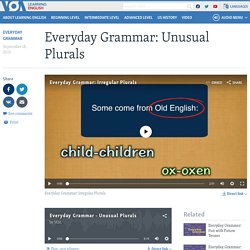
Seuss children’s story. Why isn’t it two fishes? You may think, “Ok, it’s hard to count fish so we group them all together. No problem.” Life on the farm It’s easy to understand that farmers would not worry about making plurals when they talk about sheep. Let’s look at some other things we can make plural. Irregular Plurals. Many nouns in English have a plural form either with an s/es ending or without.

For example, when is it correct to use youth vs. youths, fish vs. fishes, or hair vs. hairs? Use youths and hairs when countable.Example: Three youths were given awards for community service. If youth is being used collectively, do not add the s. Example: The youth of today watch less TV but spend more time on the computer. When youth is used as a collective noun, you may follow it with either a singular or plural verb. Examples: The hairs on her chin were long. The words fish and fishes are interchangeable, although some references say to use fishes when referring to two or more species. Examples: This fish is huge. The 100 Most Common Irregular Plural Nouns in English. Most English nouns form their plural by adding either -s (books, bands, bells) or -es (boxes, bunches, batches).

Plural form of words ending in -us. In English, the plural form of words ending in -us, especially those derived from Latin, often replaces -us with -i.
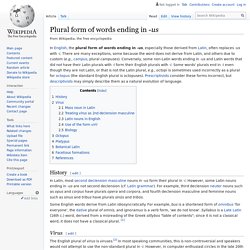
There are many exceptions, some because the word does not derive from Latin, and others due to custom (e.g., campus, plural campuses). What Is the Plural of 'Mouse'? Today’s topic is irregular plural nouns, odd nouns such as “ox” and “oxen.”
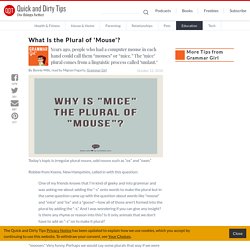
Robbie from Keene, New Hampshire, called in with this question: One of my friends knows that I'm kind of geeky and into grammar and was asking me about adding the “-s” onto words to make the plural but in the same question came up with the question about words like "moose" and "mice" and "ox" and a "goose"—how all of those aren't formed into the plural by adding the “-s.”
And I was wondering if you can give any insight? Is there any rhyme or reason into this? Is it only animals that we don't have to add an “-s” on to make it plural? Robbie made me laugh when he placed a follow-up call asking me to imagine pluralizing all these words like the word "oxen": "goosen," "micen," and "moosen. " What Is the Plural of Virus? It is common knowledge that the plurals of many words from Latin end in "-a" or "-i.
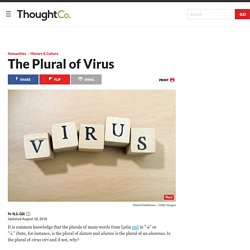
"
Irregular Plurals. Why the Plural of “Die” Is “Dice,” not “Douse” What's the Singular of Dice? Academic Writing in English, Lund University. Some English nouns are tricky to use because they are uncountable instead of countable.
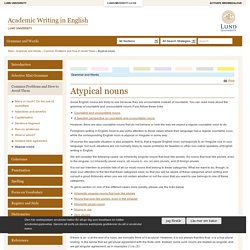
You can read more about the grammar of countable and uncountable nouns if you follow these links: However, there are also countable nouns that do not behave or look the way we expect a regular countable noun to do. Foreigners writing in English need to pay extra attention to those cases where their language has a regular countable noun, while the corresponding English noun is atypical or irregular in some way. Of course the opposite situation is also possible, that is, that a regular English noun corresponds to an irregular one in your language, but such situations are not normally likely to cause problems for Swedes or other non-native speakers of English writing in English. It is not our intention to provide lists of all (or most) nouns that belong to these categories. To get to section on one of the different cases more quickly, please use the links below.
Base plurals. Foreign Plural. Irregular Plural Nouns. Irregular plurals, unlike regular plurals, don’t necessarily follow any particular pattern—instead, they follow a lot of different patterns.
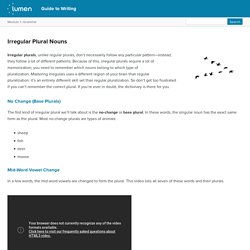
Because of this, irregular plurals require a lot of memorization; you need to remember which nouns belong to which type of pluralization. Mastering irregulars uses a different region of your brain than regular pluralization: it’s an entirely different skill set than regular pluralization. So don’t get too frustrated if you can’t remember the correct plural. If you’re ever in doubt, the dictionary is there for you.
No Change (Base Plurals) The first kind of irregular plural we’ll talk about is the no-change or base plural. Sheepfishdeermoose Mid-Word Vowel Change In a few words, the mid-word vowels are changed to form the plural. Note: The plural for a computer mouse (as opposed to the fuzzy animal) can either be mice or mouses. Plural –en And last we have plural –en. Child → childrenox → oxenbrother → brethrensister → sistren Practice Show Answer. Irregular Nouns. Exception to Rule 2.1: Do not add an s to (some) irregular countable nouns when referring to 2 or more in number.
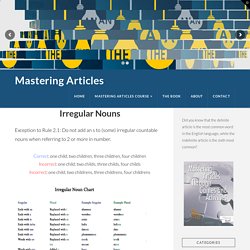
Correct: one child, two children, three children, four children Incorrect: one child, two childs, three childs, four childs Incorrect: one child, two childrens, three childrens, four childrens a 0 of 9 questions completed Questions: Information Pluralize the irregular nouns that end with us with i. e.g. alumnus/alumni You have already completed the quiz before. You must sign in or sign up to start the quiz.